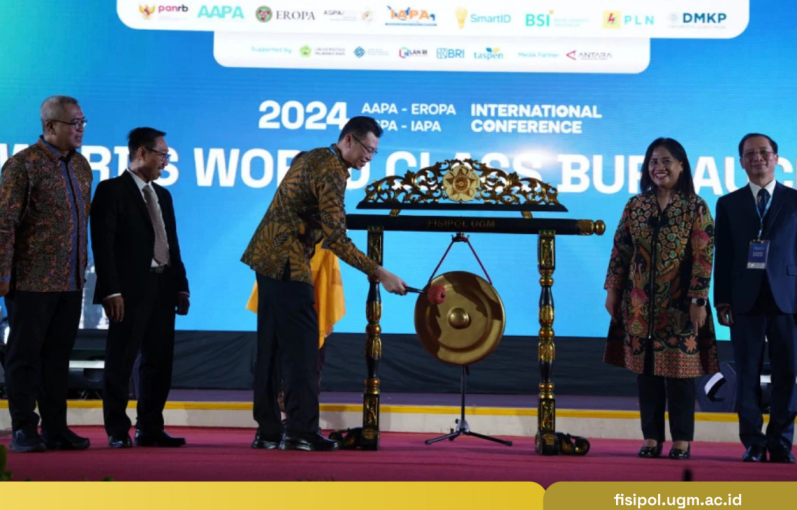
Attended by more than 600 experts, government institutions, and academia, this conference titled “Towards World Class Bureaucracy” discussed the development of public administration, including the issue of bureaucracy and policies in tackling global challenges. Prof. Dr. Wening Udasmoro, S.S., M.Hum., DEA, as UGM’s Vice Rector for Education and Learning, welcomed the organization of the first joint conference at UGM.
“We feel honored to have the joint conference to be held here in UGM. We need to create resilience and bureaucracy in order to tackle global challenges,” Wening spoke. She then continued on to explain the essence of cross-sector and cross-country collaboration in discussing strategies tackling global challenges. In this case, UGM as an academic institution has an agenda that it prioritizes, that is digital transformation, public sector innovation, and creating an ecosystem for SDGs.Agus Pramusinto, as the president of AAPA and IAPA, emphasized that this conference can be expected to generate a global commitment to develop a system of bureaucracy that puts the people’s interest first in line. “We hope that this conference will solidify the discussion towards public administration and networking, improve the quality of public policy, and strengthen networks in research and studies in Asia, Africa, and Europe” Agus added in his explanation.
Correspondingly, Acting Secretary of the Ministry of Administrative Reform and Bureaucratic Reform of the Republic of Indonesia (PANRB) Erwan Agus Purwanto explained the many challenges that the new government faces. “Our president, Mr. Prabowo, specifically wanted a reformation on bureaucracy. Later, the government is expected to create a system that is responsive, effective, and is based on the public interest,” he said.
According to Erwan, the global world has entered the 5.0 Society era, which resulted in the phenomena of Volatility, Uncertainty, Complexity, and Ambiguity (VUCA). Facing this challenge isn’t exactly simple, as the government has to keep preserving the growth of the national economy every year. Technological development isn’t just used as an information tool anymore, but it is also used to provide solutions for societal problems.
“In the year 2050, Indonesia will have many potential to become a country with the fourth biggest economy in the world, and with that the government needs to open up every opportunity,” Erwan explained. He then continued on to say that a change of strategy is needed in the government, from input-oriented to outcome-oriented. If before the government had focused on the revenues and spendings, now the government must put its focus on the impact it has on society as a whole. For example, how big of an impact it is towards the people in every national budget.
Due to that, Erwan mentioned the steps taken by the president in the early days of the new government in eradicating corruption. A system which is corrupt will not only harm the country, but also excludes the people’s access and interests on public policies. “In the cabinet meeting, our strategy is to be agents of collaboration for the private and academic sector. Change is needed in order to increase development and the welfare of the people” he added.
This conference was attended by more than 600 participants from 27 countries. There were 6 panel discussion sessions attended by more than 30 speakers from the government, academic, and practitioners sectors. The topic for the panel discussion includes eight sub themes, that includes digital transformation, operationalisation of AI and Big Data, entrepreneurship bureaucracy, post-pandemic bureaucracy, inclusivity and crisis management. The discussion lasted for two days, specifically from the 5th of November to the 7th of November 2024 at the Grha Sabha Pramana and the Faculty of Social and Political Science (Fisipol UGM).
